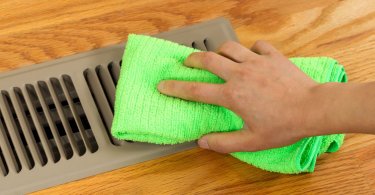
Tired of having cold feet and frozen fingers during those long and chilly winters? You need a space heater to give you the warmth and comfort you long for.
But hold on. There’s so much you need to know about space heaters to make the right decision. So allow us to make this task easy for you.
Below, we describe the various kinds of space heaters, how to place them, and some precautions that you should take. We’ve also included a nifty buying guide, so read on to know more in our comprehensive space heater guide.
What is a Space Heater?
Space heaters effectively provide heat to warm up a room using different technologies. They can’t heat up connected rooms, unlike central heating systems – they’re good for closed spaces. In simple terms, they are the solution to make a room comfortable and keep winter chills at bay.
As we said earlier, there are several types available. Some consume electricity, while others use fuels such as propane or natural gas. Space heaters also use different methods to spread heat, such as radiation and convection.
Related Post: Best Space Heaters to Keep Warm Without Any Electricity
Radiant heaters heat objects (including humans) that are nearby. Meanwhile, convection heaters only heat the surrounding air, which moves forward with the help of natural airflow inside the room. Some heaters also have fans to aid with this process.
Either way, they’re perfect for warming up a bedroom or an office room. Larger heaters can even heat bigger rooms, such as a TV lounge.
Different Types of Space Heaters
Long ago, people sufficed with just a burning flame to get some warmth in the winter months. Today, we can choose between many different types of electrical and combustion heaters.
We have categorized them below and listed their pros and cons:
Ceramic Space Heaters
Ceramic space heaters can be radiant or convective. Inside a ceramic heater, several ceramic plates are present. It uses electricity to heat these plates to the extent that they start radiating heat. After this, it spreads the heat by radiation or forces it out with a fan.
Pros:
- Usually lightweight and portable
- Convective fan ceramic heaters heat rooms quickly
- Keeps giving off some heat after its powered off
Cons:
- Requires insulated spaces to maintain warmth
- Radiant ceramic heaters take a while to heat rooms
Oil-Filled Space Heaters
These heaters work in almost the same way as a ceramic heater – just replace the ceramic plates with oil.
When electricity passes through it, the oil inside the heater heats up. It eventually becomes hot enough to heat up the metal rods. In effect, these rods heat the surrounding air and spread it through the natural airflow (convection currents) in the room.
And there’s no need for refilling – the heater keeps reusing the same oil. Unfortunately, though, oil-filled heaters can’t use fans – they only use convection currents to heat up the room’s air.
Pros:
- Works quietly
- Relatively safer as no hot elements are exposed
- Keeps the room warm for a long time
Cons:
- Takes longer to heat a room
- Heavier than other kinds of space heaters
Infrared Space Heaters
Unlike ceramic and oil-filled ones, infrared space heaters emit electromagnetic waves to heat objects and living beings nearby. It’s a similar process to how the sun heats up our planet.
Hence, infrared heaters can’t heat up the entire room. They’re the best type of heaters for spot heating – if you’re in the line of sight, you’ll feel instant warmth.
Infrared heaters can accomplish this by vibrating molecules in the air with the help of a quartz element inside. And don’t worry, these rays aren’t harmful. They’re similar to sunshine but without any dangerous UV rays.
Pros:
- Not noisy
- Provides instant warmth
- Energy-efficient, as they provide spot heating
Cons:
- The exterior may turn hot
- Immediately stops heating as soon it powers off
Read Next: Ceramic VS Infrared Heaters
Propane Space Heaters
Unlike the rest of the types we’ve discussed, propane space heaters don’t use electricity to run. Instead, they utilize liquid propane to operate.
This means that they combust fuel and release fumes for which they need venting. However, some models are vent-free for your convenience.
Most propane heaters are infrared, but you can find ceramic ones (with or without fans) too. And since they don’t need electricity, they are super portable heaters – you can even use them outside, like in your backyard.
Pros:
- Very portable
- Less expensive to operate when compared to electric space heaters
- Most types heat up pretty quickly
Cons:
- Requires you to refill fuel
- Not as safe as electric heaters
- May require venting
Related Post: Kerosene VS Propane Heater
Where to Place a Space Heater
Like most electrical and fuel-based appliances, you need to be mindful of where you place your space heater. When choosing a location, keep the following aspects in mind:
Position
You should place your heater in whichever location you’ll stay at for the longest time. In your room, put the device in that spot where the heat reaches your bed quickly.
On other occasions, choose a room where most of your family members will spend their time, such as your TV lounge. Also, keep in mind that things like furniture or other objects aren’t blocking the way – a high corner table or a similar position might be a good idea.
Moisture
Secondly, your space heater shouldn’t be near any dampness or leaking pipes. This can damage your heater and prove to be hazardous.
Select a dry place, away from any dangers of spills, leakages, and moisture. For instance, don’t place your space heater in a bathroom. If needed, purchase a space heater specifically designed for use in basements and other common damp areas.
Read Also: 5 Best Bathroom Space Heaters Reviewed in Detail
Walls
Never set them against a wall. Space heaters have vents at the backside, and placing them against the walls means blocking these vents.
Hence, always leave a gap of more than one foot between the wall and the heater for safety.
People and Pets
Another thing to remember is that you should keep heaters away from foot-traffic. Don’t place them at locations such as near a door or in a hallway where people and pets could mess with it or topple it over.
Keep is at a stable location and out of the reach of children and pets.
Related Post: Top 5 Safest Space Heaters for Pets
Space Heater Safety Tips
Even though most heaters have several safety features, you should still take precautions. Below are some safety measures to keep in mind:
- Keep flammable stuff like drapes and clothes away from the device.
- Don’t keep anything too near the heater – maintain distances of four feet.
- Don’t fall asleep while the heater runs.
- Try not to leave the room for too long when the heater is running.
- Avoid using extension plugs – use the wall outlet.
- Keep it at a place where it won’t topple over.
- Any source of moisture should be kept away from space heaters.
- Check to make sure your smoke alarms work properly.
- Keep it away from the reach of pets and children.
- Make sure it’s in good condition – clean filters and no damaged cords.
Read our Pelonis Heater Reviews and Buyer’s Guide
What to Look for When Buying a Space Heater
Now that you understand how various heaters work and ways to use them safely, let’s talk about the specifics. Consider the following features and aspects when purchasing one:
Type of Heater
Consider the mechanism of the heater. Do you want quick spot heating through an infrared or radiant heater? Or would you rather wait a while and heat up the whole room through convective heaters?
Also, think about the power source. Electric heaters are easier to maintain but are costly to run. On the other hand, combustion space heaters, such as those that use propane, are cheaper to operate but need regular refilling.
Size
How big is your room? Consider this when buying a heater, as every heater can support a certain number of square feet.
The higher the wattage, the more heat it can provide. Check the specifications of your selected heater to make sure it supports the size of your room.
Safety Features
Safety always comes first. So before you get distracted by other unique selling points of the space heater, check for safety features.
Your heater should turn off automatically in case it topples over. Also, look for exteriors that don’t get hot and are safe to touch.
Space heaters also have sensors that shut the thing off when the internal temperature gets too high. You should also look for certifications that prove they’re safe to use inside households.
Energy Efficiency
Look for energy star rated models, as they will reduce running costs. Plus, if you’re part of the go green gang, choose electric heaters. They are generally more efficient and eco-friendly, unlike combustion heaters, which release harmful gases.
Other Features
Some other convenient features you should look for include:
- Timer
- Portability (like having wheels and being lightweight).
- Thermostat
- Remote control
- Quiet mode
Read Next: Why Does My Heater Smell of Burning Plastic?
Final Word
Do space heaters effectively warm up closed spaces? Absolutely. Are they safe, though? Depends on the product. Always make sure your space heater has certifications from a reputable organization to ensure they’re safe to use inside your house.
Apart from this, if you take precautions and locate your heater smartly, winter won’t be coming – not at least in your room.
Related article: How to Turn On a Wall Heater (New Step-By-Step Guide)




